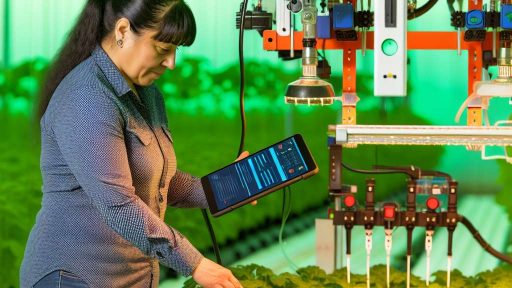Introduction to the Farm-to-Fork Supply Chain and its Challenges
The farm-to-fork supply chain encompasses every step of food production.
This journey begins with agricultural practices and ends at consumer tables.
However, the supply chain faces numerous challenges that impede transparency.
The Importance of Transparency
Transparency builds trust between consumers and food producers.
It allows consumers to know where their food comes from.
Additionally, transparency promotes food safety and quality assurance.
Current Challenges in the Supply Chain
One major challenge is the complexity of the supply chain.
Multiple stakeholders often operate at different levels of the chain.
This complexity can lead to information silos and miscommunication.
Lack of Data Sharing
Data sharing among stakeholders is often limited.
Each player may have its own system and methods for tracking products.
This results in inconsistencies and inefficiencies in the supply chain.
Fraud and Mislabeling
Fraudulent practices can compromise food integrity.
For instance, mislabeling can mislead consumers about food quality.
Unfortunately, these issues can damage consumer trust and brand reputation.
Transform Your Agribusiness
Unlock your farm's potential with expert advice tailored to your needs. Get actionable steps that drive real results.
Get StartedRegulatory Pressures
Increased regulatory scrutiny adds to the challenges.
Food producers must comply with stringent food safety regulations.
Maintaining compliance can be overwhelming for smaller operations.
The Role of Technology
Technology offers promising solutions to enhance supply chain transparency.
Blockchain technology can provide a decentralized way to track products.
This innovation ensures secure, real-time information sharing among stakeholders.
Overview of Blockchain Technology and Its Core Principles
Blockchain technology supports secure digital transactions across various sectors.
It operates on a decentralized network to enhance transparency and trust.
This technology allows multiple parties to access the same data simultaneously.
Each transaction on a blockchain is recorded in a transparent and tamper-proof manner.
Defining Blockchain Technology
Blockchain consists of a series of interconnected blocks containing transaction data.
Every block is linked to the previous one, ensuring data integrity.
Users can verify transactions without needing a central authority.
This decentralization mitigates the risk of data manipulation or fraud.
Core Principles of Blockchain
- Transparency: All participants can view the transaction history.
- Security: Transactions are cryptographically secured and resistant to tampering.
- Decentralization: No single entity controls the entire network.
- Immutability: Once recorded, data cannot be altered or deleted.
How Blockchain Works
When a transaction occurs, it is broadcasted to the network for verification.
Nodes in the network validate the transaction using consensus algorithms.
Once confirmed, the transaction is added to the blockchain as a new block.
This process ensures all participants have access to the updated information.
Benefits of Blockchain in Supply Chains
Blockchain enhances traceability throughout the supply chain.
It allows consumers to trace the origin of products accurately.
This traceability builds consumer trust in the products they purchase.
Furthermore, it improves efficiency by streamlining processes and reducing paperwork.
How Blockchain Enhances Traceability in Agricultural Products
The Role of Blockchain Technology
Blockchain technology creates a secure and immutable record of transactions.
This technology enables farmers to document every step of the supply chain.
Showcase Your Farming Business
Publish your professional farming services profile on our blog for a one-time fee of $200 and reach a dedicated audience of farmers and agribusiness owners.
Publish Your ProfileMoreover, it ensures that all data remains accurate and tamper-proof.
Benefits of Enhanced Traceability
Enhanced traceability increases consumer trust in agricultural products.
Consumers can verify the origin and quality of their food.
This transparency encourages ethical farming practices.
It also empowers buyers to make informed purchasing decisions.
Real-Time Data Access
Blockchain allows real-time access to supply chain information.
This immediate data availability helps reduce fraud and contamination risks.
As a result, stakeholders can respond swiftly to issues as they arise.
Collaboration Among Stakeholders
Blockchain fosters collaboration among farmers, suppliers, and retailers.
This collaboration leads to better communication and coordination.
Ultimately, it enhances the overall efficiency of the supply chain.
Case Studies of Successful Implementation
Several companies have successfully integrated blockchain into their operations.
AgriDigital, an Australian firm, tracks grain supply chains using blockchain.
This system improves accountability and reduces disputes.
Similarly, Walmart uses blockchain to trace produce back to its source.
This practice increases food safety and minimizes waste.
Explore Further: Sustainable Farming Practices Using Controlled Environment Systems
Case Studies: Successful Integration of Blockchain in Agriculture
Introduction to Blockchain in Agriculture
Blockchain technology transforms agricultural supply chains.
This technology enhances transparency and efficiency.
Farmers and consumers benefit significantly from its implementation.
Enhancing Traceability
Traceability is critical in the agricultural sector.
Blockchain allows every transaction to be securely recorded.
This method offers a clear view of product origins.
Consumers gain access to reliable information about their food.
For example, FreshFields implemented blockchain in their supply chain.
This initiative allowed them to track the journey of produce from farm to store.
Case Study: IBM Food Trust and Walmart
IBM Food Trust collaborates with Walmart to improve food safety.
This partnership uses blockchain to streamline the food supply chain.
It provides instant access to product details, minimizing safety issues.
Data on produce can be traced back to its source in seconds.
This quick access reduces contamination risks effectively.
Improving Efficiency
Blockchain automates transactions and reduces paperwork.
This innovation enhances overall operational efficiency.
Farmers can focus more on production rather than administrative tasks.
For example, AgriDigital introduced blockchain for grain tracking.
This step simplifies payment processes for producers.
Case Study: Kroger’s Blockchain Initiative
Kroger adopted a blockchain system to improve their supply chain.
This initiative enhances their tracking of produce quality.
Kroger reports that the system saves time during recalls.
Their ability to track items back to farms increases food safety.
Showcase Your Farming Business
Publish your professional farming services profile on our blog for a one-time fee of $200 and reach a dedicated audience of farmers and agribusiness owners.
Publish Your ProfileBuilding Trust with Consumers
Trust is vital for a healthy agricultural market.
Blockchain allows consumers to verify food sources effortlessly.
By doing so, it strengthens consumer confidence in brands.
One notable example involves the startup, Provenance.
This company uses blockchain to share product stories with consumers.
They successfully enhance trust between farmers and buyers.
Challenges and Considerations
Integrating blockchain is not without challenges.
Technical knowledge and infrastructure can hinder implementation.
Farmers may struggle to adapt to new technologies.
However, partnerships and education can alleviate these issues.
Future Prospects
The future of blockchain in agriculture looks promising.
As more stakeholders get involved, adoption will increase.
This growth will enhance transparency and efficiency further.
Consequently, consumers will enjoy safer and more reliable food.
You Might Also Like: Solar Irrigation Solutions for Efficient Water Use
Challenges and Limitations of Implementing Blockchain in Supply Chains
Technical Complexity
Blockchain technology presents significant technical challenges.
Integrating it into existing supply chains requires specialized knowledge.
Moreover, many companies lack the necessary technical infrastructure.
This complexity can result in operational disruptions during implementation.
High Initial Costs
Implementing blockchain necessitates considerable financial investment.
Initial costs include technology acquisition, training, and integration.
Smaller companies may struggle to allocate sufficient budgets.
This financial barrier can limit widespread adoption in the industry.
Scalability Issues
Scalability remains a significant concern for blockchain applications.
As the size of the supply chain grows, transactions can slow down.
Many existing blockchain solutions struggle to handle high transaction volumes.
Consequently, this can lead to inefficiencies in the supply chain.
Data Privacy Concerns
Data privacy issues complicate blockchain implementation in supply chains.
Stakeholders often worry about sensitive information being exposed.
This concern can hinder cooperation among supply chain partners.
When privacy is compromised, trust between parties diminishes.
Regulatory Challenges
Navigating regulatory landscapes adds complexity to blockchain adoption.
Different regions have varying regulations regarding data handling.
Compliance with these regulations can be time-consuming and costly.
It is essential for companies to stay updated on legal requirements.
Resistance to Change
Many organizations exhibit resistance to change in their processes.
Employees may fear job loss due to automation and new technologies.
Such resistance can impede the successful implementation of blockchain.
Building a culture that embraces innovation is crucial for success.
Learn More: Benefits Of Genetically Modified Crops For Modern Farmers
Showcase Your Farming Business
Publish your professional farming services profile on our blog for a one-time fee of $200 and reach a dedicated audience of farmers and agribusiness owners.
Publish Your Profile
Potential Impact of Blockchain on Consumer Trust and Food Safety
Enhancing Transparency in the Supply Chain
Blockchain technology provides a transparent record of transactions.
This transparency enables consumers to trace food products from farm to fork.
By accessing this information, consumers can make informed choices about their food.
Moreover, retail brands benefit from demonstrating accountability.
Building Consumer Trust
When businesses use blockchain, they enhance credibility.
Consumers feel more confident in the quality and safety of their food.
This trust can lead to increased loyalty toward brands that prioritize transparency.
Furthermore, consumer awareness fosters a demand for safer food products.
Improving Food Safety Standards
Blockchain allows for real-time monitoring of food products.
This capability helps detect contamination issues swiftly.
In turn, companies can respond rapidly to potential food safety risks.
By leveraging blockchain, organizations can ensure compliance with safety regulations.
Reducing Food Fraud
Food fraud is a significant issue in the supply chain.
Blockchain helps combat this by providing immutable records.
Organizations can verify the authenticity and origins of food products.
This verification process ultimately protects consumers from misleading claims.
Encouraging Sustainable Practices
Transparency in the supply chain promotes sustainable agricultural practices.
Consumers increasingly prefer to buy from environmentally responsible producers.
Blockchain can track and verify sustainable practices along the supply chain.
This verification aids in building a market for responsibly sourced products.
Facilitating Collaborative Efforts
Blockchain fosters collaboration among stakeholders in the food industry.
Producers, distributors, and consumers can share vital information efficiently.
Collaborative platforms built on blockchain enhance collective problem-solving.
In addition, they facilitate knowledge sharing regarding best practices.
Gain More Insights: IoT-Driven Data Analytics for Farm Productivity
Future Trends: The Role of Smart Contracts in Agriculture Supply Chains
Understanding Smart Contracts
Smart contracts are digital agreements stored on a blockchain.
They execute automatically when predefined conditions are met.
This automation reduces the potential for human error.
Further, it enhances trust among parties involved.
Enhancing Transparency
Smart contracts provide a clear, indisputable record of transactions.
Every participant can access this information in real time.
This transparency fosters accountability across the supply chain.
As a result, consumers can trace their food back to its origin.
Streamlining Processes
Smart contracts can automate payments within supply chains.
For example, a farmer receives payment immediately upon delivery.
This immediacy improves cash flow for farmers.
Additionally, it simplifies invoicing and reduces administrative costs.
Improving Traceability
With smart contracts, each product can carry pertinent information.
This includes its origin, handling, and journey to the consumer.
Consequently, stakeholders can quickly confirm product authenticity.
Showcase Your Farming Business
Publish your professional farming services profile on our blog for a one-time fee of $200 and reach a dedicated audience of farmers and agribusiness owners.
Publish Your ProfileThis capability is vital in addressing food safety concerns.
Facilitating Collaboration
These contracts encourage collaboration among supply chain participants.
Farmers, distributors, and retailers benefit from shared data.
This collaboration enhances decision-making and operational efficiency.
Moreover, it fosters innovation in supply chain management.
Looking Ahead
The future of agriculture supply chains looks promising with smart contracts.
As technology evolves, the adoption of smart contracts will increase.
This trend signals a shift towards a more efficient and transparent market.
Ultimately, it benefits all stakeholders from farm to fork.
Strategies for Farmers and Stakeholders to Adopt Blockchain Solutions
Understanding Blockchain Basics
Farmers and stakeholders must first understand blockchain technology.
It is crucial to comprehend how blockchain enhances transparency.
Additionally, recognizing its role in traceability is vital.
Engaging with educational resources can aid in this understanding.
Evaluating Needs and Opportunities
Each farmer should assess their unique needs regarding supply chain management.
This evaluation will help identify specific opportunities for blockchain integration.
Moreover, partnerships with technology firms can provide valuable insights.
Building a Collaborative Network
Establishing a collective of farmers and stakeholders is essential.
This network will support shared learning and collective investment.
Furthermore, collaboration enhances resource sharing among participants.
Investing in Technology
Farmers must invest in the necessary technology for blockchain implementation.
Consideration should be given to user-friendly platforms.
Additionally, investing in training for staff is equally important.
Engaging with Consumers
Communication with consumers is essential to build trust.
Informing them about the benefits of blockchain in the supply chain is crucial.
Using marketing strategies to highlight transparency can boost consumer confidence.
Continuous Learning and Adapting
Farmers should embrace a mindset of continuous learning.
Staying updated on blockchain innovations will be beneficial.
Furthermore, adapting strategies based on industry trends is vital.
Tracking Implementation Success
After implementing blockchain, tracking its effectiveness is crucial.
Gathering feedback from stakeholders can provide insights into improvements.
Incorporating performance metrics will help measure success.
Additional Resources
Leveraging Blockchain in Agriculture for Enhanced Traceability of …
Revolutionizing Agriculture: How Farm-to-Fork Traceability Boosts …




